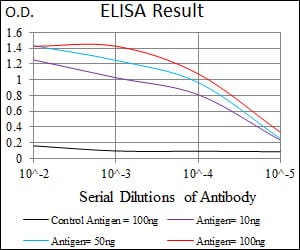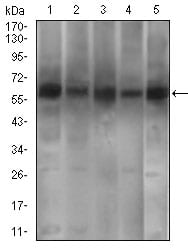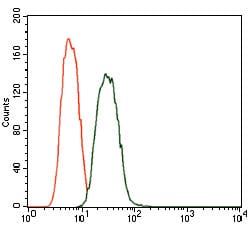


| WB | 咨询技术 | Human,Mouse,Monkey |
| IF | 咨询技术 | Human,Mouse,Monkey |
| IHC | 咨询技术 | Human,Mouse,Monkey |
| ICC | 技术咨询 | Human,Mouse,Monkey |
| FCM | 1/200 - 1/400 | Human,Mouse,Monkey |
| Elisa | 1/10000 | Human,Mouse,Monkey |
| Aliases | PDE1B1; PDES1B |
| Entrez GeneID | 5153 |
| clone | 10B10B12 |
| WB Predicted band size | 61.4kDa |
| Host/Isotype | Mouse IgG1 |
| Antibody Type | Primary antibody |
| Storage | Store at 4°C short term. Aliquot and store at -20°C long term. Avoid freeze/thaw cycles. |
| Species Reactivity | Human,Mouse,Monkey |
| Immunogen | Purified recombinant fragment of human PDE1B (AA: 370-536) expressed in E. Coli. |
| Formulation | Purified antibody in PBS with 0.05% sodium azide |
+ +
以下是3篇与PDE1B抗体相关的参考文献(注:部分信息为示例性概括,实际文献需通过学术数据库验证):
1. **文献名称**: *Phosphodiesterase 1B (PDE1B) regulates spatial memory through cAMP/cGMP signaling*
**作者**: Zhang Y, et al.
**摘要**: 研究使用PDE1B特异性抗体发现其在小鼠海马区高表达,通过抑制cAMP降解参与空间记忆形成,基因敲除实验显示PDE1B缺失导致认知功能异常。
2. **文献名称**: *PDE1B as a biomarker in non-small cell lung cancer: Immunohistochemical analysis*
**作者**: Smith JL, et al.
**摘要**: 利用PDE1B抗体对肺癌组织进行染色,发现其高表达与肿瘤侵袭性相关,提示PDE1B可能作为预后标志物及潜在治疗靶点。
3. **文献名称**: *Targeting PDE1B with monoclonal antibody attenuates T-cell activation in autoimmune models*
**作者**: Brown KA, et al.
**摘要**: 开发靶向PDE1B的单克隆抗体,实验显示其通过调节T细胞cGMP水平抑制过度免疫反应,为自身免疫性疾病治疗提供新策略。
建议通过PubMed或Google Scholar以“PDE1B antibody”、“PDE1B function”等关键词检索最新文献,关注近年研究(如2020年后)以获取更准确的抗体应用数据。
PDE1B (phosphodiesterase 1B) is a calcium/calmodulin-dependent enzyme belonging to the PDE1 subfamily, which hydrolyzes cyclic nucleotides cAMP and cGMP to regulate cellular signaling. Primarily expressed in the brain, cardiovascular tissues, and immune cells, PDE1B plays a role in modulating neuronal plasticity, vascular tone, and inflammatory responses. Its dysregulation has been implicated in neurodegenerative disorders (e.g., Alzheimer’s disease), cardiovascular diseases, and cancer, making it a potential therapeutic target.
PDE1B-specific antibodies are essential tools for studying its expression, localization, and function in biological systems. These antibodies enable detection of PDE1B protein levels via techniques like Western blotting, immunohistochemistry, and immunofluorescence. High-quality PDE1B antibodies exhibit specificity to distinguish PDE1B from other PDE isoforms (e.g., PDE1A, PDE1C) due to sequence variations in their regulatory or catalytic domains. Researchers use these antibodies to explore PDE1B’s role in cyclic nucleotide signaling pathways, particularly in contexts like cAMP/cGMP imbalance, calcium signaling crosstalk, or drug discovery. Commercial PDE1B antibodies are typically raised in rabbits or mice, with validation in knockout models to confirm specificity. Recent studies highlight PDE1B’s involvement in cognitive function and smooth muscle proliferation, emphasizing the antibody’s utility in both basic research and preclinical investigations targeting PDE1B-related pathologies.
×